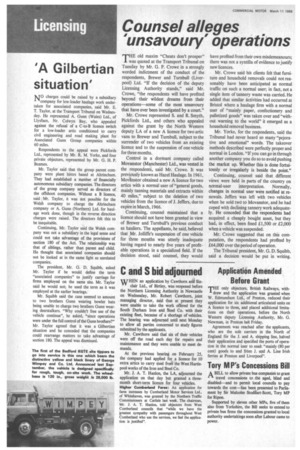Counsel alleges 'unsavoury' operations
Page 48

If you've noticed an error in this article please click here to report it so we can fix it.
THE old maxim "Cheats don't prosper" was quoted at the Transport Tribunal on Tuesday by Mr. G. P. Crowe in a strongly worded indictment of the conduct of the respondents, Brewer and Turnbull (Liverpool) Ltd. "If the decision of the deputy Licensing Authority stands," said Mr. Crowe, "the respondents will have profited beyond their wildest dreams from their operations—some of the most unsavoury that have ever been investigated by a court."
Mr. Crowe represented S. and R. Smyth, Pickfords Ltd., and others who appealed against the grant by the North Western deputy LA of a new A licence for two artic vans to Brewer and Turnbull, subject to the surrender of two vehicles from an existing licence and to the suspension of one vehicle for three months.
Control in a dormant company called Movanstor (Manchester) Ltd., was vested in the respondents, said Mr. Crowe. It was previously known as Hazel Haulage. In 1961, Movlinstor obtained a new A licence for two artics with a normal user of "general goods, mainly tanning materials and extracts within 40 miles," subject to the deletion of two vehicles from the licence of J. Jeffers, due to expire in March, 1966.
Continuing, counsel maintained that a licence should not have been granted in view of Brewer and Turnbull's previous conduct as hauliers. The appellants, he said, believed that Mr. Jolliffe's suspension of one vehicle for three months was utterly inadequate having regard to nearly five years of profitable operations in a specialized field. If the decision stood, said counsel, they would have profited from their own misdemeanours; there was not a syntilla of evidence to justify new licences.
Mr. Crowe said his clients felt that furniture and household removals could not reasonably have been anticipated as normal traffic on such a normal user; in fact, not a single item of tannery waste was carried. He added that similar activities had occurred at Bristol where a haulage firm with a normal user of "mainly paper, confectionery and palletized goods" was taken over and "without warning to the world" it emerged as a household removal business.
Mr. Yorke, for the respondents, said the Tribunal had never heard so many "pejorative and emotional" words. The takeover methods described were perfectly proper and normal in London. "If you can go in through another company you do so to avoid pushing the market up. Whether this is done fortuitously or irregularly is beside the point."
Continuing, counsel said that different views were held in parts of the country on normal-user interpretation. Normally, changes in normal user were notified at renewals. Jeffers was left with two vehicles when he sold two to Movanstor, and he had coped with declining tannery work adequately. He conceded that the respondents had acquired a cheaply bought asset, but they had, in effect, been fined £1,500 or £2,000 when a vehicle was suspended.
Mr. Crowe suggested that on this computation, the respondents had profited by £64,000 over the period of operation.
The Tribunal president, Mr. G. D. Squibb, said a decision would be put in writing.








































































































































